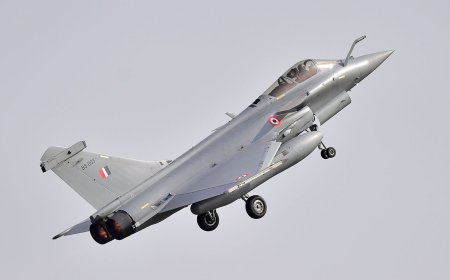One month after Ahmedabad plane crash, kin of passengers on same route admit to anxiety
A month after the Ahmedabad plane crash, families of passengers on the same route share ongoing emotional distress despite aviation safety reforms and normalized air traffic.

Ahmedabad, July 12, 2025 — A month after the tragic plane crash near Ahmedabad airport that claimed 62 lives and shook the nation's confidence in aviation safety, relatives of passengers who frequently travel the same route continue to struggle with lingering fear and anxiety. While flight operations have returned to normal, emotional turbulence lingers for those who send off loved ones flying between Ahmedabad and other major cities.
A Tragedy Remembered
On June 12, 2025, Flight AG-921 operated by Western Air crashed shortly after takeoff from Ahmedabad's Sardar Vallabhbhai Patel International Airport en route to Mumbai. Initial reports cited a possible engine malfunction during a rare dust storm that contributed to poor visibility. A detailed investigation is still underway, but the psychological impact on families and travelers has already taken root.
Rita Solanki, whose husband is a regular flier on the Ahmedabad-Mumbai sector, said, “It’s difficult to say goodbye without worry now. Every time he boards a flight, I’m tense until he lands and messages me.”
Airline Response and Regulatory Oversight
In the wake of the crash, the Directorate General of Civil Aviation (DGCA) launched a sweeping review of safety protocols and emergency maintenance records. Western Air, the carrier involved, has grounded its entire fleet of Airbus A320neo aircraft pending inspection.
Civil Aviation Minister Jyotiraditya Scindia recently addressed the Parliament stating, “This incident, while rare, was a wake-up call. We are increasing the frequency of audits and mandating simulator-based training refreshers for all domestic pilots operating in high-risk weather corridors.”
Despite these assurances, a survey conducted by TravelSecure India showed a 17% decline in bookings for routes operating from Ahmedabad in the two weeks following the crash, with a notable dip in repeat flyers.
Emotional Fallout Among Frequent Flyers
Though the aviation industry is statistically among the safest modes of travel, the visibility of plane crashes often leads to disproportionate emotional reactions.
Dr. Manan Joshi, a clinical psychologist based in Ahmedabad, observed a rise in anxiety-related consultations since mid-June. “We’ve seen patients who now request sedatives before flights or experience symptoms of panic when thinking about air travel. Trauma from such incidents extends beyond those directly affected.”
Frequent business traveler Mehul Patel said he has shifted to train travel for now, despite longer durations. “I know it’s irrational. I’ve flown hundreds of times. But now, that one moment flashes before my eyes when I walk into an airport.”
Air Traffic Patterns and Airline Confidence
Despite the emotional hesitancy among some travelers, data from the Airports Authority of India shows that overall passenger traffic through Ahmedabad airport has normalized. In fact, July’s first week clocked a 3% increase in domestic movement compared to the same period last year, hinting at the resilience of India's aviation sector.
Ajay Dua, aviation analyst at AeroSight Consulting, said, “Such incidents, while tragic, don’t tend to have long-term commercial impact unless there's repeated mishandling. Western Air is cooperating with regulators and insurance bodies, and their transparency will be crucial in restoring confidence.”
Insurance and Investment Implications
In the stock market, aviation companies saw marginal volatility immediately following the incident. Western Air’s parent company lost nearly 4.6% in valuation the week after the crash. However, shares have since recovered 3.2%, aided by broader market bullishness and corporate reassurances of safety overhauls.
Insurance providers, too, have updated their policies. Bharti Insurance announced a revised premium structure for domestic aviation coverage while offering extended mental health support coverage for affected families.
Investment firm Reliant Partners stated in its mid-year outlook, “We remain overweight on Indian aviation in the medium term, driven by strong domestic demand, airport infrastructure upgrades, and easing fuel prices. However, investor sensitivity to safety incidents remains high and could cause temporary divestment patterns.”
Looking Ahead: Restoring Trust
As the aviation sector navigates forward, the challenge lies not just in mechanical reliability but also in emotional reassurance. Airlines are investing in customer communication strategies and even considering optional in-flight therapist consultations for nervous travelers.
The government is also working on a public awareness campaign that reinforces India’s aviation safety record, while highlighting the rarity of fatal crashes.
“Ultimately,” says aviation consultant Sneha Verma, “confidence comes from consistency. One crash does not define an airline or an airport. But how we respond to it — with empathy, transparency, and reform — shapes long-term trust.”
For families watching flight apps with trembling hands, that trust is hard-earned. But as with many forms of healing, time and reassurance may eventually smoothen the turbulence.
What's Your Reaction?
 Like
0
Like
0
 Dislike
0
Dislike
0
 Love
0
Love
0
 Funny
0
Funny
0
 Angry
0
Angry
0
 Sad
0
Sad
0
 Wow
0
Wow
0












































































